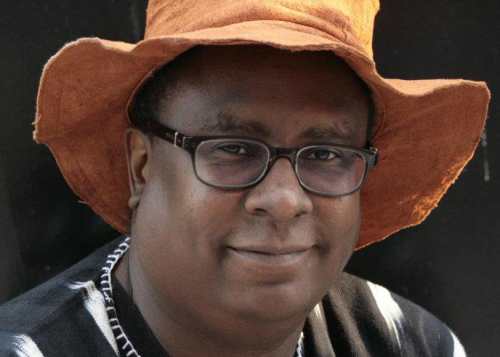Rosarium: Diversity is 'Simply Who We Are'

Take a look at the author page at three-year-old Rosarium Publishing and you don’t even have to mention the word “diversity.” The writers’ faces, which come in many hues, speak for themselves. To Bill Campbell, Rosarium’s founder and chief, diversity isn’t about adding a few people of color, it’s something that “just is.” We live in a multicultural world, so of course publishing should reflect that. Campbell publishes science fiction and comics in order to please a kind of minority within minorities. You might call them nerds of color, and they rarely see themselves reflected in the wider nerd culture. I’ll let Campbell talk about what that means in our interview below.
Bill Campbell, Rosarium Publishing
There’s a lot of discussion about lack of diversity in publishing. What does diversity mean to you and what is Rosarium doing to achieve it?

Bill Campbell: 'I don't really think of diversity as a cause or a strategy or anything like that. Diversity just is.'
I don’t really think of diversity as a cause or a strategy or anything like that. Diversity just is. We live in a multicultural country in an even more multicultural world. It is time that our mainstream culture reflects that.
Milton Davis recently wrote that the only way diversity can truly be achieved in publishing is by companies whose very lifeblood is diversity. That’s basically Rosarium. I’m half African-American/half Jamaican. My family stretches from Jamaica to Taiwan with nearly everyone in between. The Rosarium family reflects that. It’s simply who we are.
I don’t know if anything we do will affect mainstream publishers. I actually don’t spend much time thinking about it. My main concern is just to keep doing what we’re doing and doing it the best way we can.
Talk about your Indiegogo campaign and what you plan to do if your goals are met.
This past campaign was all about moving to offset printing. Rosarium was started on a simple idea: What if everybody got to tell their own stories. What it didn’t start with was a lot of money. This has all been financed out of money from my day job. So, we’ve relied heavily on print-on-demand. Now, we’re at a point where our initial print runs are too large for POD, and POD is too expensive. So, we have to move to offset; but I’m not an investment banker, I help produce audio books for the blind; my day job couldn’t cover the transition. Fortunately, since we’ve made our campaign goal, we can now afford moving to offset.
What kinds of chances can Rosarium and its authors take that a Big 5 publisher just wouldn’t allow?
Well, we’re not even three years old yet, so everything we do is a risk, really. We don’t have any established models to fall back on. It’s another one of those cases where I don’t really think about what mainstream publishers are doing. I’m pretty sure they wouldn’t have done APB: Artists against Police Brutality, but obviously, there’s nothing that we’ve done that they couldn’t have done.
So far, we’ve reviewed The Assimilated Cuban’s Guide to Quantum Santeria and The End of the World Is Rye. They were both praised for the quality of writing, imagination, and humor. Are those the elements of every Rosarium book?
Not in every Rosarium book, but definitely in a few. Diversity, for us, isn’t a matter of demographics, but also subject matter. So, we have more satirical novels like Rye or American Candide. We have crime novels like Making Wolf and The Jones Men. And, of course, the comics are all over the place, too, with horror (C21st Gods, Blue Hand Mojo, Manticore), kids comics (Malice in Ovenland, Little Black Fish, Sun Dragon’s Song), and slice-of-life (Jennifer’s Journal and Bread and Butter). We really are all over the place. We hope that our one overriding principle, though, is quality.
Can you name some upcoming releases you’re excited about?
For the rest of the year, we’re concentrating mostly on the comics we’ve been publishing digitally these past couple years. So, we’ve got Malice in Ovenland (about a little girl stuck in a magical land of greasy ghouls in her mother’s oven), The Adventures of Wally Fresh (which is a madcap comedy about a single guy in Brooklyn with a ninja next-door neighbor and a talking beaver for a roommate), The Little Black Fish (a retelling of an ancient Persian folktale about a little fish constantly defying everybody’s insistence that she know her place), Chadhiyana (about a female assassin in an imagined medieval India), DayBlack, Vol. 2 (about a vampire tattoo artist), and the aforementioned prison horror, Manticore. On the fiction side, we have a book of speculative fiction short stories by Maurice Broaddus, The Voices of Martyrs. I’m excited about them all. There’s a lot of beautiful art and excellent storytelling coming your way.
Comic books, science fiction. Are you out to prove that nerds are a more diverse group than portrayed in the media?
In all honesty, I’m trying to give all those diverse nerds growing up now a chance to see themselves reflected in the culture they love so much. To give them the books I wish I’d had when I was growing up.

Howard Lovy is executive editor at Foreword Reviews. You can follow him on Twitter @Howard_Lovy
Howard Lovy
